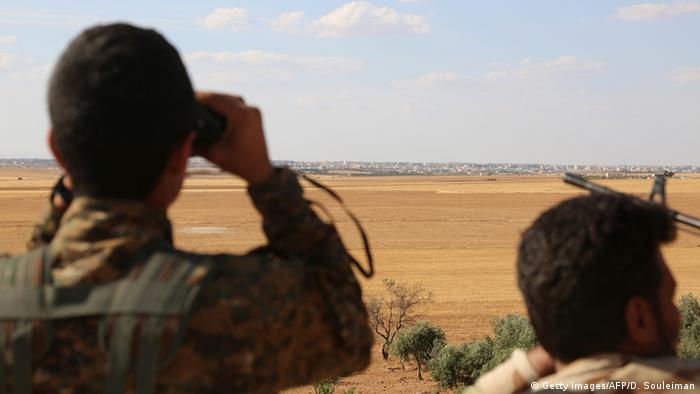SYRIAN kurds look west Manbij victory
- Albanian Shqip
- Amharic አማርኛ
- Arabic العربية
- Bengali বাংলা
- Bosnian B/H/S
- Bulgarian Български
- Chinese 中文
- Croatian Hrvatski
- Dari دری
- English English
- French Français
- German Deutsch
- Greek Ελληνικά
- Hausa Hausa
- Hindi हिन्दी
- Indonesian Bahasa Indonesia
SYRIA
Syrian Kurds look west after Manbij victory
After retaking Manbij from IS, the Syrian Democratic Forces look to advance west to unite Kurdish controlled areas. The force has been enshrined as the US partner on the ground.
Thousands of civilians started to pour back into northern Syrian city of Manbij on Saturday, a day after the US-backed Syrian Defense Forces (SDF) recaptured the strategic transit point.
The sight of grateful civilians welcoming the SDF as liberators sets a new tone in the fight against IS as the US-backed force sets its eyes of clearing "Islamic State" (IS) territory further to the west.
The Arab and Kurdish umbrella group liberated Manbij after a nearly two months of fighting that brought them over the Euphrates and deep into IS controlled territory. The strategy was to cut off the Sunni extremist group's supply lines running from the Turkish border to IS's self-declared capital in Raqqa.
The success of the SDF offensive, backed by US airstrikes and special forces on the ground, gives new momentum to the US-led anti-IS coalition. It also, again, enshrines the SDF as Washington's most capable partner on the ground.
"The partnership between US and SDF has reached a new milestone with the capture of Manbij," Mutlu Civiroglu, a Kurdish affairs analyst who is in regular contact with the SDF's military and political leadership, told DW.
Facts on the ground
Formed last year at US prodding, the bulk of the SDF is composed of the Syrian Kurdish YPG militia, but also includes Arab, Christian and Turkmen rebel factions that provide the force with greater legitimacy as it advances out of heavily Kurdish populated areas.
Parallel to its battlefield successes, the YPG's political wing, the PYD, has laid the groundwork for a Kurdish dominated autonomous region. The Syrian Kurds have over the course of the 5-year civil war bought their time and created facts on the ground.
While no friends of the regime in Damascus, the Kurds have taken a so-called "third-position," taking sides neither with Assad or Islamist rebel factions seeking his ouster. They are now in the unique position of being the only actors on the ground with relations with the regime, Russia and the United States. The combined military, political and territorial strengths gives the SDF a major bargaining chip in any political solution in the country.
Crossing redlines
The SDF's growing political and military clout is likely to further enrage neighboring Turkey, which views the YPG as a terrorist group due to its close relations with the Kurdistan Workers' Party (PKK) fighting in Turkey.
Ankara has repeatedly had its "redlines" broken by the Syrian Kurds and the United States. The latest iteration is in Manbij, where first the SDF crossed the Euphrates, thereby crossing one "redline," then again when the YPG led the recapture of the city. This appears to have broken a reported understanding between Ankara and Washington that Arab forces would take the lead in Manbij.
Uniting the cantons
The Syrian Kurd's ultimate goal to clear IS-controlled territory further to the west of Manbij in order to unite their territories in the northeast, the so-called cantons of Kobane and Jazira, with Afrin.
"The SDF desires to go west to Afrin, which has been under political and economic embargo by the al-Nusra Front and other Turkey supported groups for over two years," Civiroglu said.
Uniting the cantons would give the Syrian Kurds an uninterrupted stretch of territory along the Turkish border, a prospect the Syrian regime and Russia may welcome as it would also weaken rebel groups they are fighting.
The question remains whether the United States will go along with a SDF offensive to unite the cantons, and equally important, Turkey's response to the prospect of a contiguous Kurdish statelet on its border and what that means for any future political solution in the country.




Comments